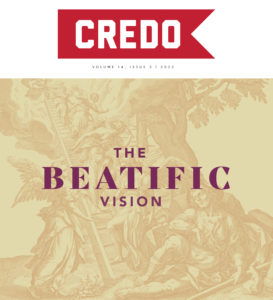
What Is Required to See God?
T he great Christian hope is communion with God as we experience it in both this life and the next. As we traverse this pilgrim life, believers are often profoundly aware of the distance between us and God’s direct presence. In the words of Westminster Shorter Catechism 19, “All mankind by their fall lost communion with God.”[1] At the end of all things after Christ returns, our removal from God’s presence will be rectified and so it will be that “the dwelling place of God is with man. He will dwell with them, and they will be his people, and God himself will be with them as their God.” (Rev. 21:3) God will be among us in a new way for restored communion with his people. In other words, we look forward to when we see God face-to-face.
he great Christian hope is communion with God as we experience it in both this life and the next. As we traverse this pilgrim life, believers are often profoundly aware of the distance between us and God’s direct presence. In the words of Westminster Shorter Catechism 19, “All mankind by their fall lost communion with God.”[1] At the end of all things after Christ returns, our removal from God’s presence will be rectified and so it will be that “the dwelling place of God is with man. He will dwell with them, and they will be his people, and God himself will be with them as their God.” (Rev. 21:3) God will be among us in a new way for restored communion with his people. In other words, we look forward to when we see God face-to-face.
How might I see God?
Christians then must ask the question: How might I see God? What does it take to reach that blessed enjoyment of seeing God? We should first respond that the Philippian jailer asked the same question: “Sirs, what must I do to be saved?” And Paul and Silas answered, “Believe in the Lord Jesus, and you will be saved” (Acts 16:30–31). Our leading reply is then the Protestant doctrine of salvation by faith alone. Some, however, might quickly interject that Scripture exhorts us to “Strive for peace with everyone, and for the holiness without which no one will see the Lord” (Heb. 12:14). Even as early as Gregory of Nyssa’s homilies on the beatitudes, reflections upon the connection between holiness and the beatific vision have given the impression of “a demand for purity that appears for all intents and purposes impossible to fulfill.”[2] Setting aside the long historical debates about exactly what it means that we might see God, this essay argues that God’s gifts of grace to believers in Christ provides all that we need to see God in perfect enjoyment of his presence in everlasting life.[3] More specifically, the Reformed doctrine of glorification, as a saving benefit received on the basis of Christ’s work applied to us rather than as something we achieve and attain because of any of our works, provides confidence that every true believer in Jesus will see God and be made happy in the enjoyment of his glory on the last day. Every true believer in Jesus will see God and be made happy in the enjoyment of his glory on the last day. Click To Tweet
The statement in Hebrews that we cannot see the Lord without holiness easily troubles believers, even as we endeavor after new obedience in the Christian life, because we know that we are sinners. We cannot see God now yet are made for that very communion with God in his direct presence. Believers have wrestled with this fallout of our sin and misery for all redemptive history. As Moses interceded to keep God from destroying Israel and to preserve his presence with his people as they went to the promised land, he exemplified our desire to rise above our distance from God to see him in his glory.
Moses said, “Please show me your glory.” And he said, “I will make all my goodness pass before you and will proclaim before you my name ‘The Lord.’ And I will be gracious to whom I will be gracious, and will show mercy on whom I will show mercy. But,” he said, “you cannot see my face, for man shall not see me and live.” And the Lord said, “Behold, there is a place by me where you shall stand on the rock, and while my glory passes by I will put you in a cleft of the rock, and I will cover you with my hand until I have passed by. Then I will take away my hand, and you shall see my back, but my face shall not be seen” (Exod. 33:18–23).
Moses wants to see God’s glory, yet God will not grant that sight to him. God’s reason was that a sinner cannot see him and live. A sinner’s inability to see God and survive then rightly raises a concern for us about the holiness that we need to possess in order to see God.
As we wrestle with how to find comfort about seeing God at the last day, the Westminster Shorter Catechism 38 helps us find our bearings toward assurance.
What benefits do believers receive from Christ at the resurrection?
At the resurrection, believers, being raised up in glory, shall be openly acknowledged and acquitted in the day of judgment, and made perfectly blessed in the full enjoying of God to all eternity.
When Christ returns, he raises his people unto glory. In 1 Corinthians 15:23, Paul outlined this order between Christ’s resurrection and ours: “But each in his own order: Christ the firstfruits, then at his coming those who belong to Christ.” This resurrection body, however, is raised imperishable, in glory, and in power because “it is raised a spiritual body” (1 Cor. 15:42–44). The resurrection body is spiritual, not because it is disembodied which would be an oxymoron of the highest order, but because the Spirit characterizes the resurrection order (1 Tim. 3:16). So then, we are raised in glorified bodies. As the Westminster Shorter Catechism 38 noted, when we are raised in glory, having glorified bodies, we then experience perfectly blessed enjoyment of God’s presence. In other words, our glorification is directly unto the beatific vision.
So already, we see that we are raised in a particular glorified body. The sheep and the goats are distinct as they step out of their graves. Christ does not make resurrected people into sheep and goats at the last judgment but divides them according to what is already visibly the case given the resurrection itself (Matt. 25:32–33). In this way, we enter the full possession of everlasting life comes to us in the same way that our justification came to us in this life: by faith alone.
This excerpt is from the latest issue of Credo Magazine. Click here to read the full article!

